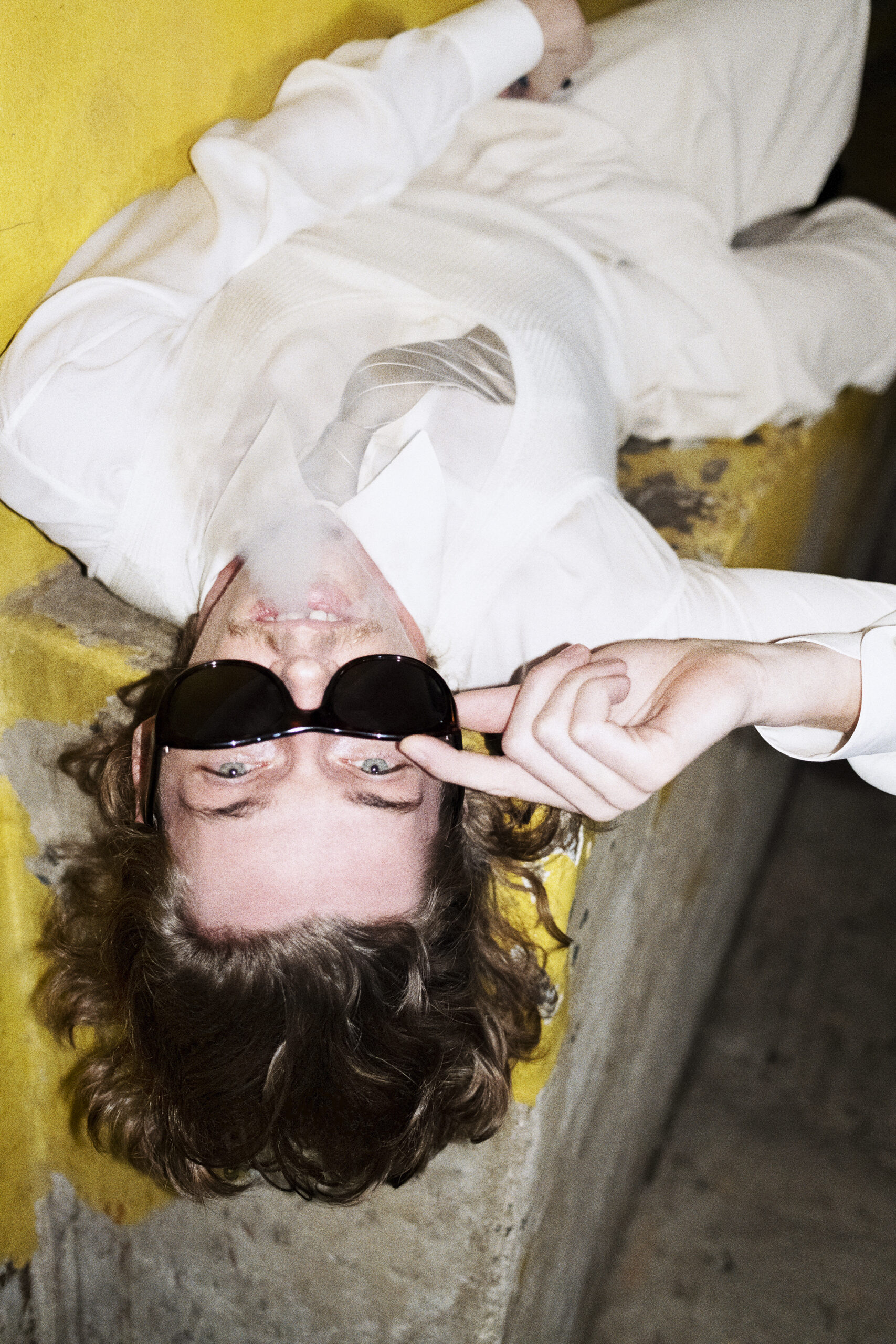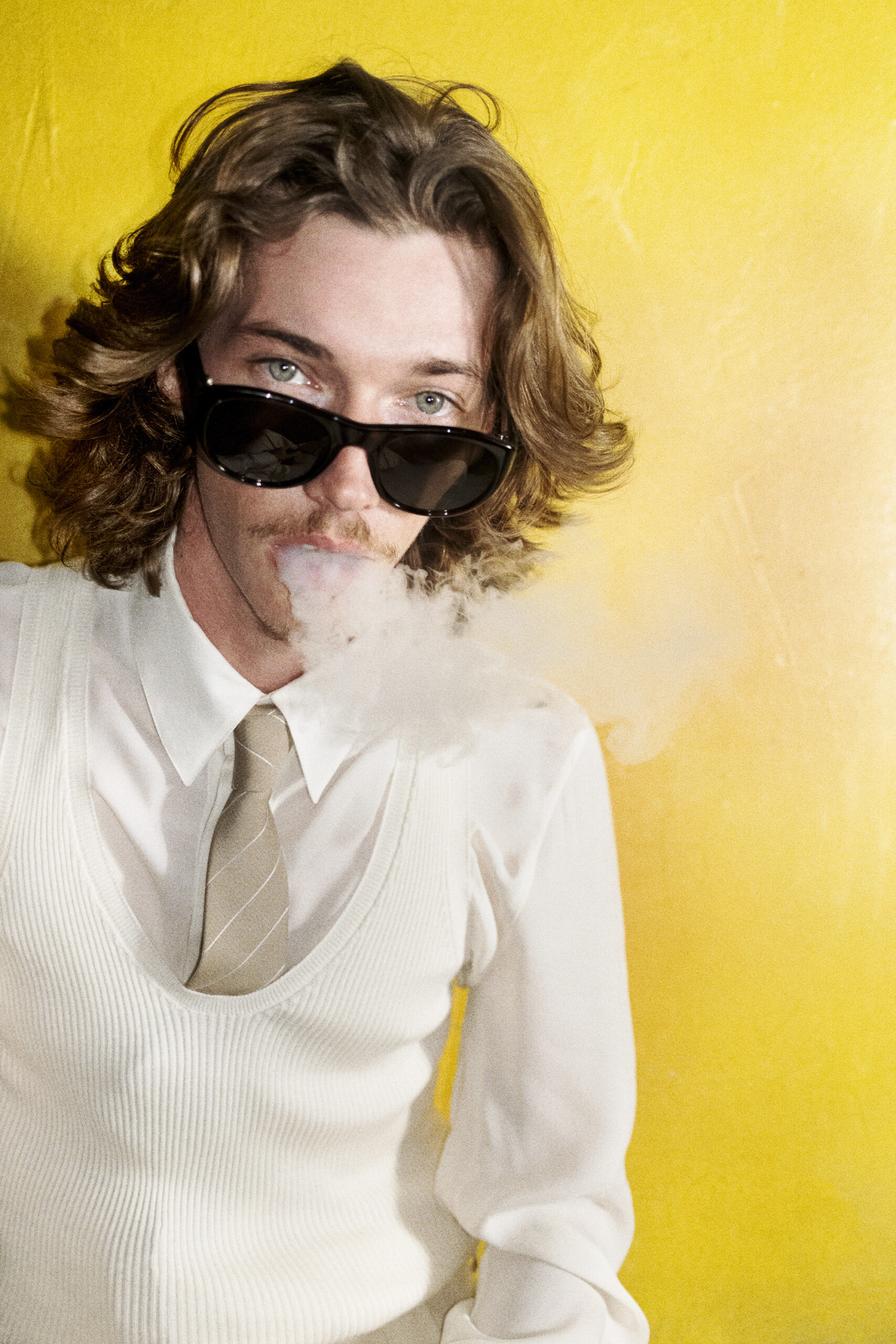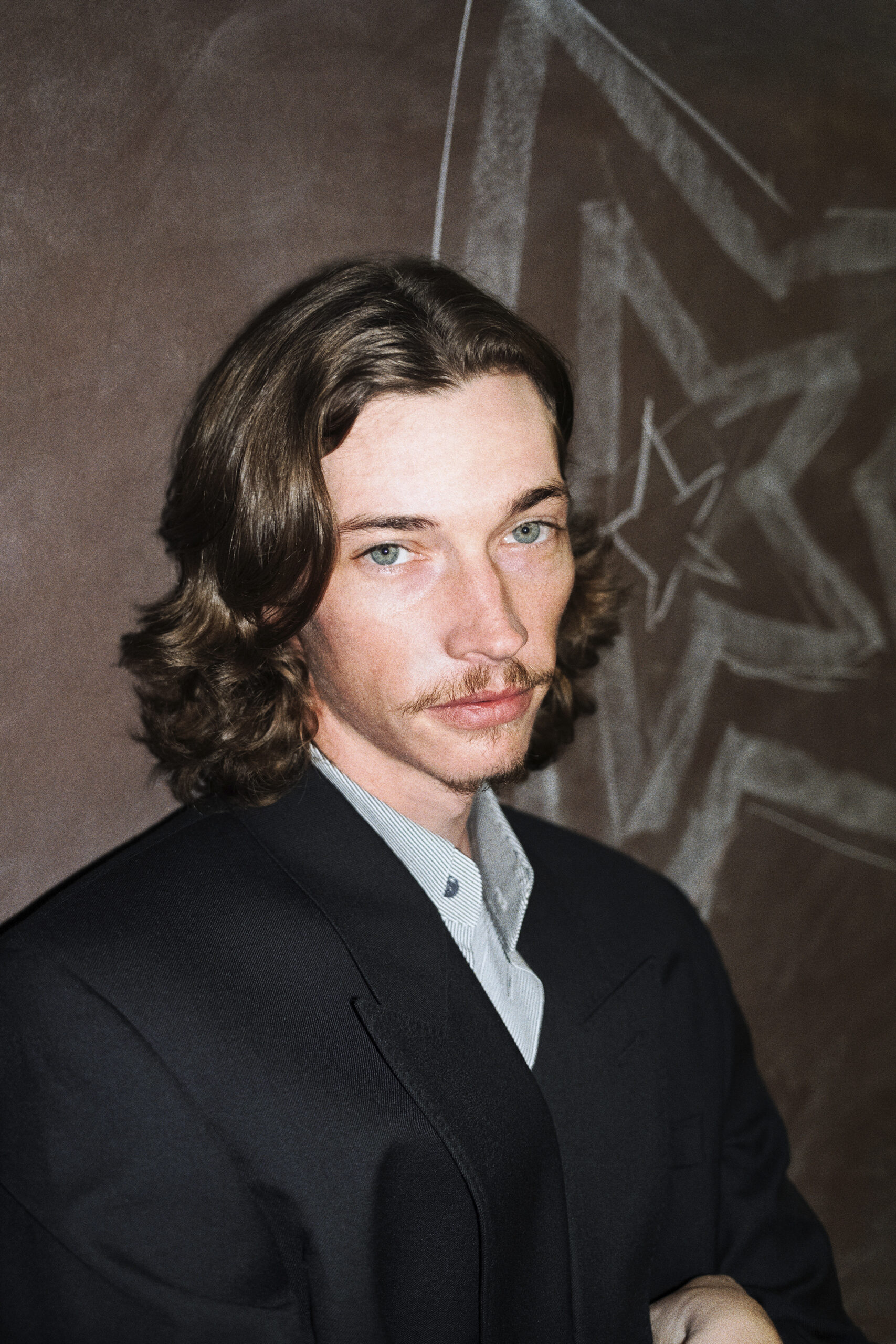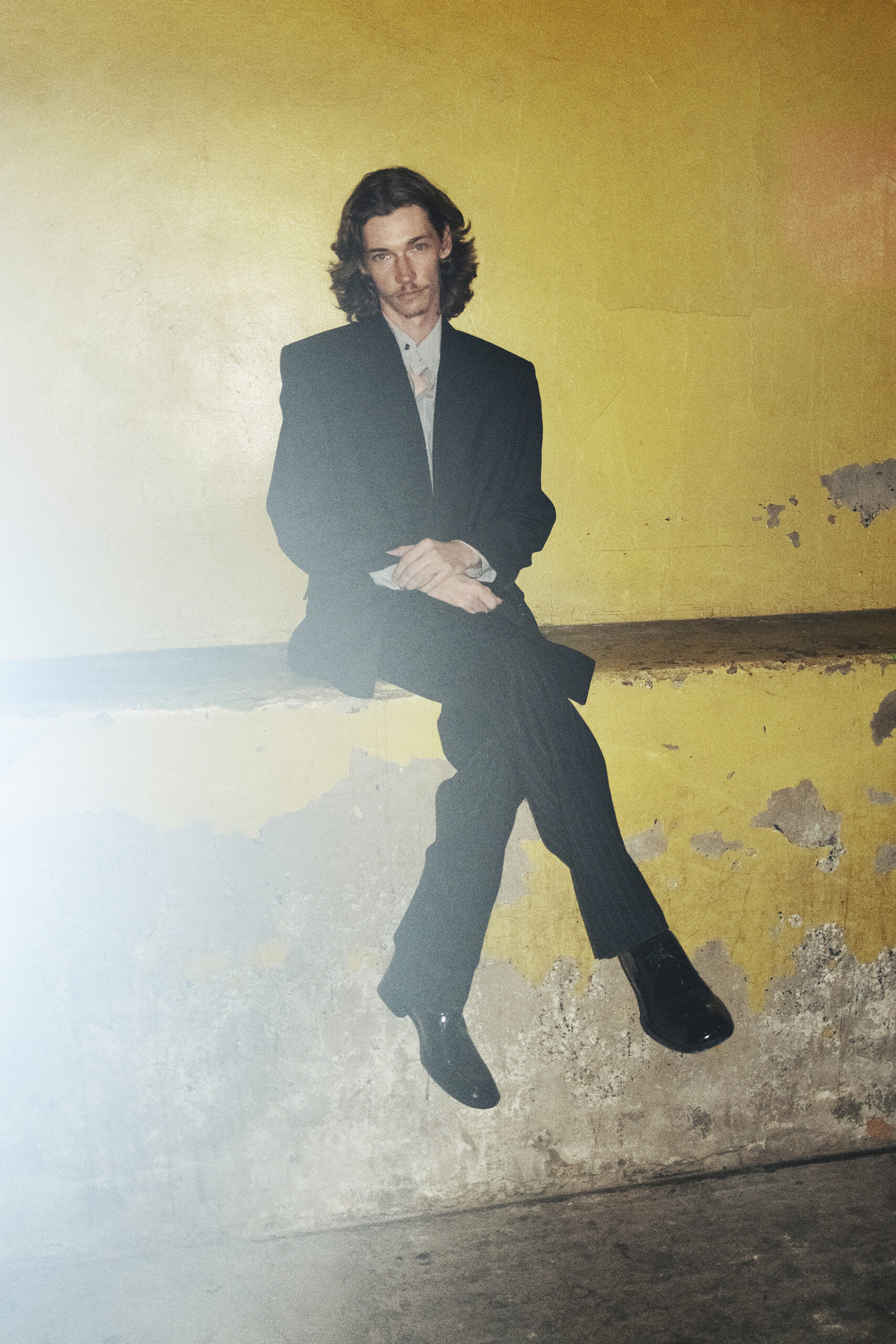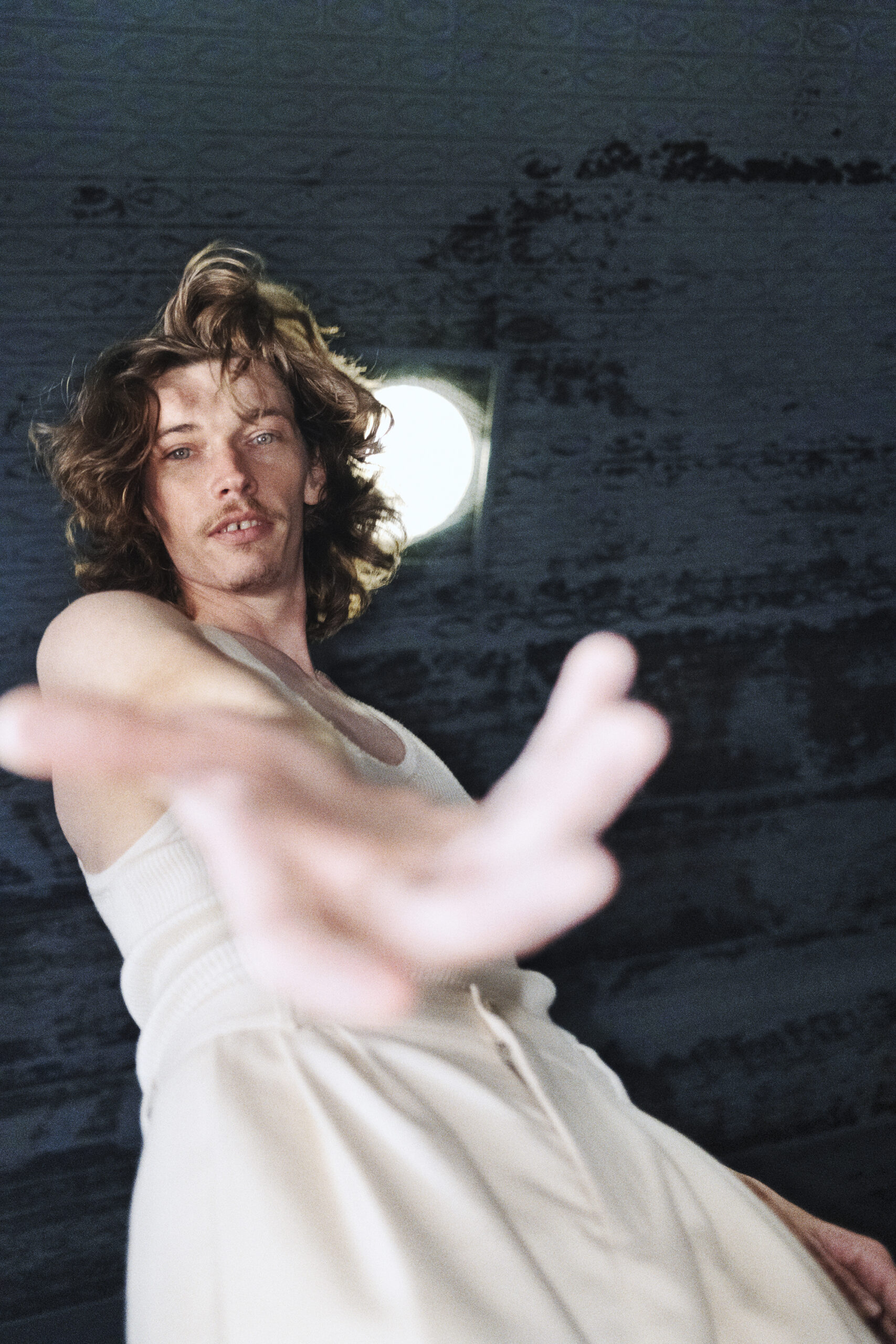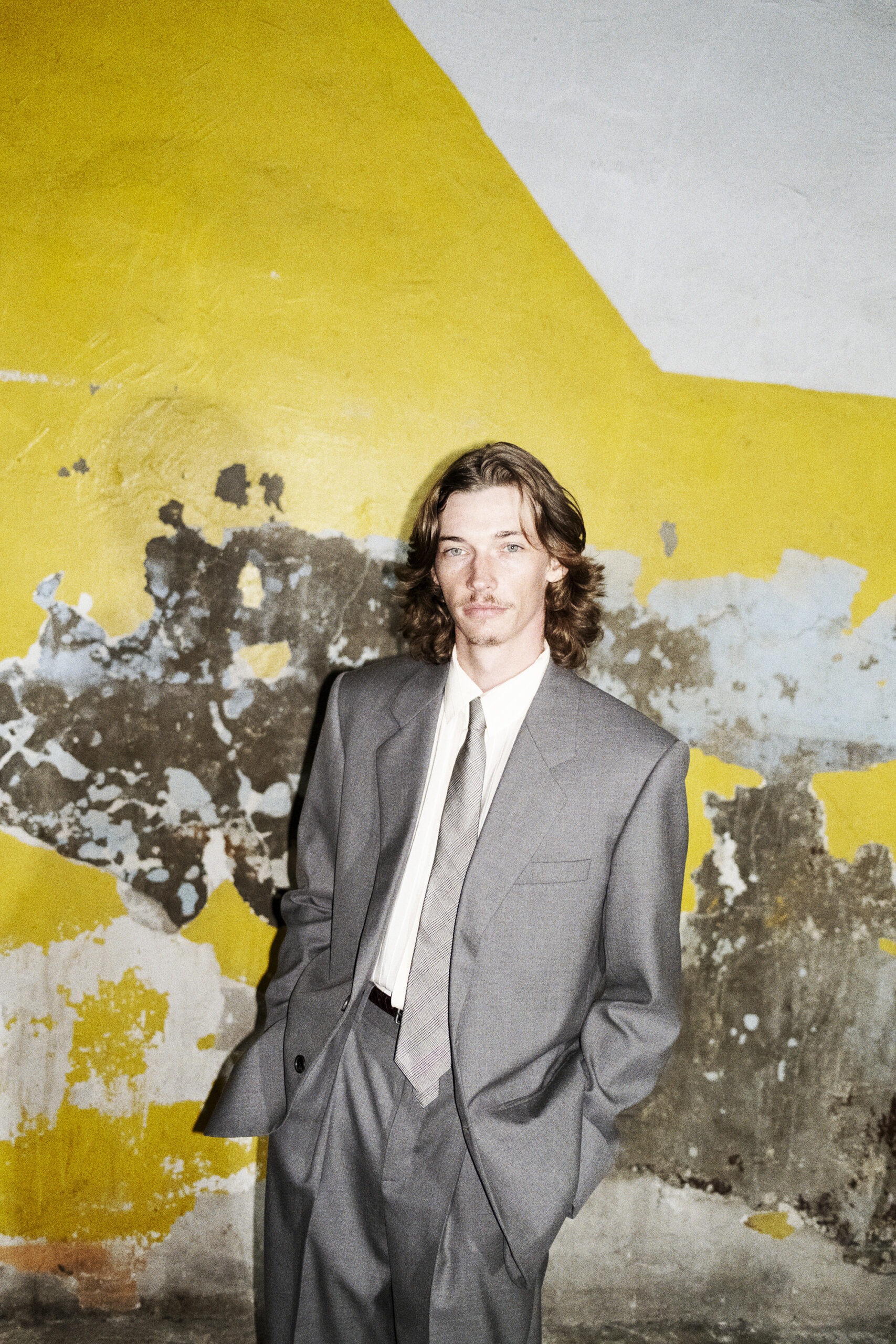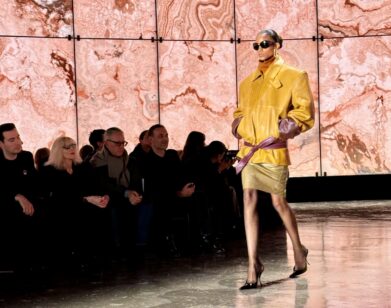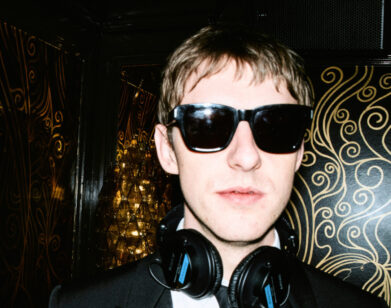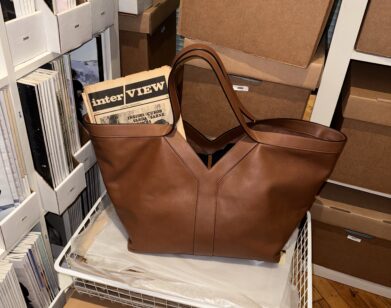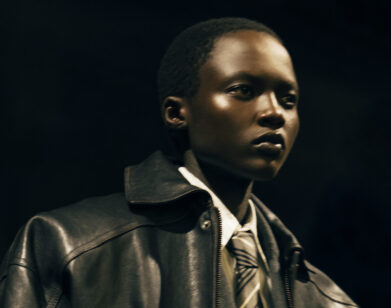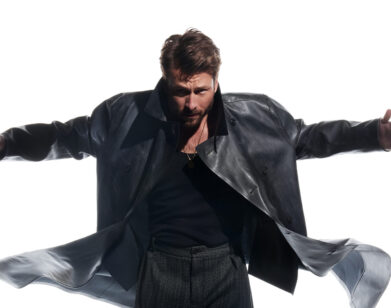COUNTRY BOY
Jacob Lofland and Matthew McConaughey on Grief, Manhood, and the Landman Effect
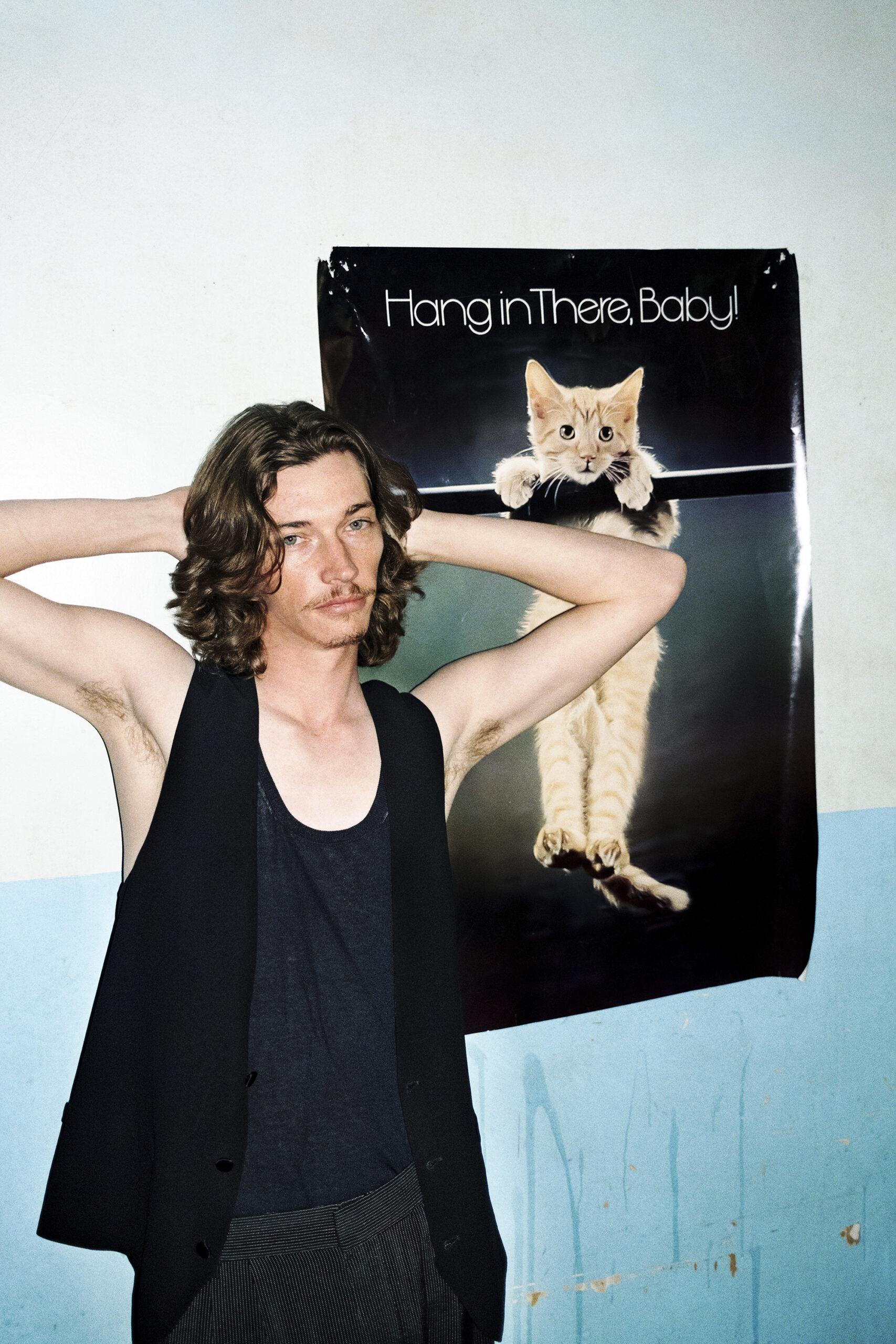
Jacob Lofland wears All Clothing and Accessories (worn throughout) Saint Laurent by Anthony Vaccarello.
Most actors ride a hit TV show straight to Hollywood ego. Not Jacob Lofland. Since debuting at 14 alongside Matthew McConaughey in Mud, he’s kept a low profile in his home state of Arkansas, picking his projects like someone who actually enjoys acting over fame. The massive success of Landman, Taylor Sheridan’s oil-soaked drama, could have changed that—but as McConaughey recently found out, at 28, Lofland is still the same guy, just with a harder time at the airport.
———
THURSDAY 9:30 AM MARCH 6, 2025 NYC
MATTHEW MCCONAUGHEY: Jacob.
JACOB LOFLAND: How are you, man?
MCCONAUGHEY: I’ve been good. What city are you in?
LOFLAND: New York, just for the day.
MCCONAUGHEY: What are you doing?
LOFLAND: Doing the shoot for this, actually.
MCCONAUGHEY: For Interview?
LOFLAND: Yes, sir.
MCCONAUGHEY: You look good, man. Hair grown out, little ’stache on you.
LOFLAND: I’m getting ready to cut it, man. I’ve dealt with it long enough.
MCCONAUGHEY: I hear you. I’m here in Austin. Kiddos are good. Camila [Alves, McConaughey’s wife] says to tell you howdy.
LOFLAND: Tell her I said hi. The last time I saw Levi, he was like three, man.
MCCONAUGHEY: I know. He’s 16 now.
LOFLAND: That’s crazy!
MCCONAUGHEY: I know it. It seems like it was the other day, but it wasn’t—it was 13 years ago. Well, listen—I want to jump into a few questions, so we give Interview something that’s worth printing. I’ve chatted with you about this before, but I remember in Mud, there’s that scene where you and Tye [Sheridan]’s character show up at the hotel and meet Juniper for the first time, right?
LOFLAND: Yeah.
MCCONAUGHEY: I love your reaction in that scene. If I remember correctly, part of your reaction to seeing Juniper for the first time was seeing Reese Witherspoon for the first time. It was this natural, shy kind of “I’m cool, I’m going to hold my ground.” That’s as good as acting can get because it was a hundred percent honest, and it was your first time.
LOFLAND: It’s so authentic.
MCCONAUGHEY: It is the best acting we can all do, you know what I mean? It’s what some actors forget to do after we learn how to act.
LOFLAND: Yes. That feeling is what I try to chase. The most natural way is still, I guess, my method. I don’t really have a process; I’m still just winging it, you know? I’ve learned a few little tricks, but I still have no idea what I’m doing.
MCCONAUGHEY: Yep, stick at that. What happens to a lot of actors is that when we learn what the hell we’re doing, we can start to forget how not to act. At the base of what we do, acting is about seeing everything. It’s the first time every time. Hang on to that, man. Tell me some stuff you’ve learned along the way with the people you’ve worked with. You’re working with Billy Bob [Thornton].
LOFLAND: Man, I’ve learned so much from everyone. You taught me the most on Mud. You always show up for your scene partners and give 110 percent. You don’t leave until the day is done. That is what started me off, and then keeping that mindset going and meeting all these other people who are dedicated to the craft, it makes you want to work harder.
MCCONAUGHEY: The work ethic, the time, being there for partners.
LOFLAND: Yeah, I’ve definitely picked up on some things, but I still don’t know what I’m doing, dude.
MCCONAUGHEY: I’m not quite sure what I’m doing, either. [Laughs] Obviously, you had the instincts. You’re on Landman now. Were there certain themes in it—power, family, survival—that made you go, “Oh, I dig that”?
LOFLAND: Man, I really connected with the oil field in general. My dad used to do it. I just lost my dad this last year, actually, so it means a lot. He told me all these stories. I really love showing this world we’ve never gotten to see inside of. No one understands how dangerous it really is and how much we rely on it, so I wanted to be a part of bringing that to the forefront.
MCCONAUGHEY:I didn’t know your dad moved on. I didn’t know he worked in the oil business, either. That’s what my whole family was in. My older brother’s still out in Midland.
LOFLAND: Oh, wow. Really?
MCCONAUGHEY: Yeah. That’s been the livelihood of my older brothers and dad.
LOFLAND: That’s been the livelihood of so many men for generations.
MCCONAUGHEY: Does the success of Landman—is it bringing new opportunities?
LOFLAND: Yeah, it definitely is. I’ll tell you one thing, going through the airport is a lot harder now.
MCCONAUGHEY: There you go. [Laughs]
LOFLAND: Other than that, I’ve tried to stay under the radar. I haven’t done a whole lot in the off-season. Losing my dad, I’ve tried to get through all that by myself.
MCCONAUGHEY: The airport thing, I remember that. I learned a trick. I won’t tell you who told it to me, but it sure is a good one. If you’re going through an airport and somebody yells your name from behind, do not stop and turn around, because you could get stopped for a long time.
LOFLAND: Just keep going.
MCCONAUGHEY: Unless you want to get stopped for a long time.
LOFLAND: Yeah, on the way down here, I was leaving out of Fort Worth, and they caught me in the security line, so there was no way out. It was a lot of fun. [Laughs]
MCCONAUGHEY: Well, you know what?
LOFLAND: I love it. Everyone’s like, “I’m sure you’re tired.” And I said, “Hey, the fact that you want to take pictures means everyone enjoys it. That’s great.”
MCCONAUGHEY: And the other thing is, that check has been cashed. You can’t go backward and uncash that check.
LOFLAND: [Laughs] There’s no taking that one back, is there?
MCCONAUGHEY: No sir, so ride with it. Let me go back to the beginning. Mud’s your first film. You hadn’t acted. Hell, you were 13, 14—it’s not like you knew what you wanted to do. Do you ever wonder what you’d be doing right now if it weren’t for that?
LOFLAND: All the time. Nothing would equate to how awesome this is, but there’s a 90 percent chance I would be working on a rig somewhere or driving a truck. It’s just what I was around and what everyone else does. But man, the things I would’ve missed. I’m appreciative every day that I made this decision, but there’s definitely times where it’s like, “I wonder what would’ve happened.”
MCCONAUGHEY: Right. I still do that same thing myself, but by now I’m like, “It gets tiring to deal with the hypothetical.” If I wouldn’t have walked into the right bar in 1991 and if I hadn’t known the bartender who introduced me to the right guy, would I be here now? Would I have met Camila? Would I have three kids? It goes on and on and on.
LOFLAND: So many “what ifs” that just worked out perfectly. Green lights, man.
MCCONAUGHEY: The red ones turn green somehow, don’t they?
LOFLAND: That’s right. Eventually.
MCCONAUGHEY: I don’t want to get too personal about your dad in an interview like this—
LOFLAND: No, that’s fine. I love talking about him.
MCCONAUGHEY: Alright. Well, when my father moved on, it was obviously hard because I didn’t even think he was killable, you know?
LOFLAND: Yeah.
MCCONAUGHEY: Through the mourning and the pain, it’s the biggest moment of becoming a man.
LOFLAND: I think it is.
MCCONAUGHEY: Do you feel like I felt? I remember feeling like, “There’s a certain safety net that I’ve always had behind me that’s gone.”
LOFLAND: You’ve always had that person that, no matter what, you could call. You had that man who gave whatever information or whatever advice—whether it helped or not, at least it was something. And once that’s gone, there’s just a lonely feeling. That’s it.
MCCONAUGHEY: Because dads are, like, they’re above the law.
LOFLAND: They’re immortal, like you said. You don’t think anything can hurt them.
MCCONAUGHEY: Yeah. I remember, though, gaining a lot of courage. There were things I was doing that he had taught me how to do, but I was kind of half-assing them, because I felt like, “Well, the real dude’s right behind me.” His moving on kind of gave me a kick in the caboose to have courage.
LOFLAND: There’s no room to stumble anymore.
MCCONAUGHEY: No. Stuff that I was a little bit afraid of, I wasn’t scared of anymore. I was like, “Oh, that’s nothing.” It grounded me in a really courageous way.
LOFLAND: I agree. I’m experiencing some of that now, actually. It’s still pretty fresh—I lost him in July. But a hundred percent—I do believe that losing the man who made you, you have no choice anymore; you better become the man that he’s taught you to be.
MCCONAUGHEY: You can’t be on deck anymore, to use a baseball term.
LOFLAND: Yeah, you got to pick your side of the fence.
MCCONAUGHEY: Well, that’s a painful but beautiful side about fathers moving on. The next thing that was seminal in my life that you might find down the line is having children.
LOFLAND: Well, I’ve actually got a 4-year-old.
MCCONAUGHEY: There you go. You know what I’m talking about.
LOFLAND:[Laughs] Yeah.
MCCONAUGHEY: Wait, when did this happen? None of my business. None of anybody’s business, either. [Laughs]
LOFLAND: No, it’s fine. Her name is Annie. She’s adorable. Me and her mom have been engaged for four years and together for about nine. We’re still not married, but we’re living a great life and really enjoy each other. My daughter’s healthy and smart and amazing, so all the things you’re saying are definitely landing.
MCCONAUGHEY: Okay, good deal! You’re shepherding in a new life.
LOFLAND: Yeah, trying to make sure she makes it. [Laughs]
MCCONAUGHEY: I don’t know if you got this yet since she’s four, but one of the cool things about having kids is it made me a better actor. They’ll go, “Daddy, what’d you do today?” Some of the stuff we do, you can’t tell them the straight story, so you have to go into a parable and make it like a little fairy tale.
LOFLAND: It really helps your imagination.
MCCONAUGHEY: It does. Well, we’ve chatted about the craft, and you’ve always seemed to be a young man who gives a damn about who he is as a person, as well. You seem to have the right amount of “give a damn” on both of those, from where I can see.
LOFLAND: That means a lot.
MCCONAUGHEY: And you’re in, you’ll see. You get a hit with something like Landman—it helps, man. More eyes, more options, more things come at you. Have you had to say no to anything yet?
LOFLAND: I have. I’m actually surprisingly good at it. [Laughs]
MCCONAUGHEY: Tell me about it.
LOFLAND: If I read something and it doesn’t click with me, it’s so easy for me to say no, because I’m afraid I’ll do an injustice to something that someone else has put so much work into. I’d rather someone who knows deep down that they can nail it to have that part.
MCCONAUGHEY: Yep. Well look, dude, you stay on that. I don’t have to tell you, but that’s a recipe for being genuine and succeeding.
LOFLAND: Thank you.
MCCONAUGHEY: It’s been good catching up with you, Jacob.
LOFLAND: Hey man, you too.
MCCONAUGHEY: I got a couple questions offline that I’ll ask you about, alright?
LOFLAND: Sounds good.
MCCONAUGHEY: Well, dude, keep it up. Congrats on the success of the show. Congrats on your 4-year-old daughter. Congrats on the way you’re dealing with your dad. Congrats on how you’re doing altogether. From what I can see, you’re sure looking good and true.
LOFLAND: I appreciate it. I’m just trying to keep my head up and keep going.
MCCONAUGHEY: That’s it. Keep getting up to the plate and keep swinging.
LOFLAND: I’m just going to keep going through green lights, I hope. I got the book [McConaughey’s 2020 autobiography Greenlights] on my nightstand, man.
MCCONAUGHEY: Ah, cool. Thank you. It’s been a gift that keeps on giving to me, that’s for sure.
LOFLAND: Yeah, not just to you. I think it’s given to a lot of people.
MCCONAUGHEY: It feels pretty doggone good, I promise you. Enjoy that long hair for the last few days, man.
LOFLAND: Hopefully it’s about to be gone. Alright, man. Thank you so much.
MCCONAUGHEY: You are welcome, Jacob. Good to see you, bud.
———
Grooming: Kiyonori Sudo using Bumble and Bumble at L’Atelier NYC.
Photography Assistant: Cade Curran.
Fashion Assistants: Josh Hickman and Nick Trotta.
Production Coordination: Claudia Malpeli.
Post-Production: Rachel Filler.
Location: Gymnopedie.

